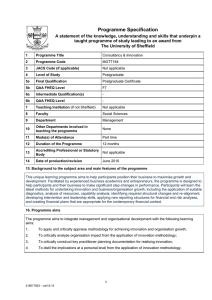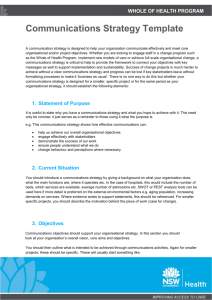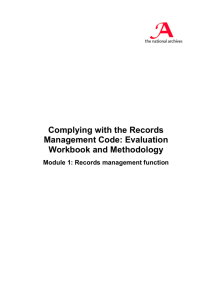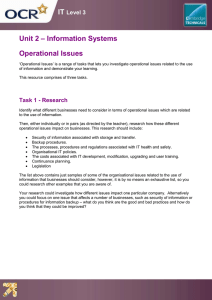Programme Specification
advertisement
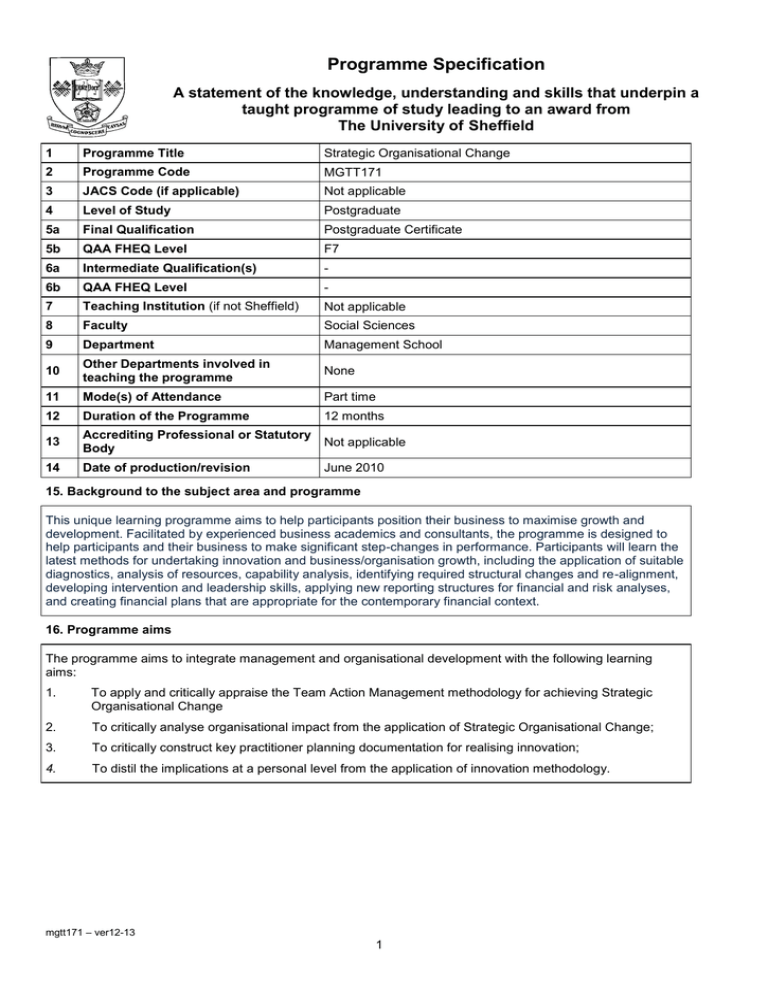
Programme Specification A statement of the knowledge, understanding and skills that underpin a taught programme of study leading to an award from The University of Sheffield 1 Programme Title Strategic Organisational Change 2 Programme Code MGTT171 3 JACS Code (if applicable) Not applicable 4 Level of Study Postgraduate 5a Final Qualification Postgraduate Certificate 5b QAA FHEQ Level F7 6a Intermediate Qualification(s) - 6b QAA FHEQ Level - 7 Teaching Institution (if not Sheffield) Not applicable 8 Faculty Social Sciences 9 Department Management School 10 Other Departments involved in teaching the programme None 11 Mode(s) of Attendance Part time 12 Duration of the Programme 12 months 13 Accrediting Professional or Statutory Body Not applicable 14 Date of production/revision June 2010 15. Background to the subject area and programme This unique learning programme aims to help participants position their business to maximise growth and development. Facilitated by experienced business academics and consultants, the programme is designed to help participants and their business to make significant step-changes in performance. Participants will learn the latest methods for undertaking innovation and business/organisation growth, including the application of suitable diagnostics, analysis of resources, capability analysis, identifying required structural changes and re-alignment, developing intervention and leadership skills, applying new reporting structures for financial and risk analyses, and creating financial plans that are appropriate for the contemporary financial context. 16. Programme aims The programme aims to integrate management and organisational development with the following learning aims: 1. To apply and critically appraise the Team Action Management methodology for achieving Strategic Organisational Change 2. To critically analyse organisational impact from the application of Strategic Organisational Change; 3. To critically construct key practitioner planning documentation for realising innovation; 4. To distil the implications at a personal level from the application of innovation methodology. mgtt171 – ver12-13 1 17. Programme learning outcomes Knowledge and understanding: Upon successful completion of the programme, candidates will be able to demonstrate knowledge and understanding of: K1 Team Action Management Methodology for strategic organisation change K2 The nature of an inquiry for undertaking critical areas of change in organisations, e.g. diagnosis, audit, capability analysis, structural & process analysis; K3 How to undertake an impact evaluation of a change involving innovation; K4 The construction of a business and project plan for innovation and change in an organisation. Skills and other attributes: Upon successful completion of the programme, students will be able to demonstrate skills and other attributes in: S1 Intervention and change in an organisation; S2 Implementation methodologies for organisational change S3 Reflexive practice in applying methodologies for organisational change. 18. Teaching, learning and assessment Development of the learning outcomes is promoted through the following teaching and learning methods: There is a highly process oriented approach to the learning in this programme. Participants will work in groups to relate the conceptual and abstract to the pragmatics of designing intervention and change into their own organisations. There will be opportunities for: (i) learning from critically analyzing situations in organizations, and (ii) learning from the fellow participants’ own reflexive thinking about their capability to operationalise the ideas/concepts/methods. The substantive methodological components will be introduced with a mixture of lectures and ‘learning set’ activities designed around the 24 stage process of the TAM Action Management framework. In order to develop this type of ‘process’ approach, the module will be taught in day blocks, supported with workbook activities. The workbook will structure the activities involved in learning and applying the innovation methodologies which form the core of the learning in the programme. The Workbook will be applied in the class based earning sets and in the candidates’ own workplaces, and will therefore help to facilitate group and individual learning. Additional support will be given using on-line facilities to assist in maximising engagement, e.g. providing access to related materials, to both fellow learners and facilitators. Further, the candidates will have mentoring support throughout this process from a team of facilitators who are made up of academics and experienced consultants. The design and implementation of specific learning programmes will be coordinated and led by academic staff of the University of Sheffield’s Management School, in order to ensure appropriate achievement of the learning outcomes as well as the overall academic rigour and quality of the programme. In consequence of the process-oriented approach to the learning, the majority of the assessed work in the Certificate involves the planning, implementation and reflection on specific projects that are of ‘core’ interest to the participants’ organisation, Consequently where a relatively strong weighting attached to the underlying projects, seen as an ongoing research process. There is therefore a strong group component to the assessment, though in all cases significant individual reporting is also required. Opportunities to demonstrate achievement of the learning outcomes are provided through the following assessment methods: Participants will use a workbook, which will be divided into two sections. (i) The workbook will be structured around the application of the key methodological skills, applied to participants own innovations in practice. This workbook will be used to assess each candidates’ progress, via the precision of application of the methods, the detail of the associated inquiry, and the validity of that inquiry mgtt171 – ver12-13 2 in each element of the methodology. (ii) The second part of the assessment, will involve the development of a set of documents detailing and justifying A Business Plan for organisational change; A Project Plan for organisational change; A critical self reflection. Each of these will be judged in academic terms, e.g. precision of the application of the methodologies, supporting inquiry, supporting evidence, conclusions drawn. These methods of assessment are used because they within the academic judgement of practical outputs. Both group assessment and individual assessment will be used for the contributory units. 19. Reference points The learning outcomes have been developed to reflect the following points of reference: Learning and Teaching Strategy (2011-16) http://www.shef.ac.uk/lets/strategy/lts11_16 i.e. 1. to demonstrate a sound knowledge base and to demonstrate the skills and competencies to apply that knowledge appropriately; 2. to carry out extended independent inquiry, formulating relevant questions and engaging critically with evidence; 3. to demonstrate the core capabilities and skills of information handling in a professional and ethical manner; 4. to be a constructive team member working collaboratively towards a shared goal and demonstrate transferable skills, where appropriate working across academic disciplines, professional and organisational boundaries; 5. to communicate effectively, orally, in writing or by other means as appropriate, and in accordance with agreed conventions; 6. to critically reflect on their strengths and weaknesses; 7. to demonstrate fitness for practice working responsibly, safely and ethically, recognising their limitations, and meeting the requirements of relevant statutory bodies. 20. Programme structure and regulations The postgraduate certificate in Strategic Organisational Change will be based around two units. Strategic Organisational Change Design (15credits), and Strategic Organisational Change Planning (15 credits), and Strategic Organisational Change Implementation (30 credits) The components must be undertaken in the specified sequence. Detailed information about the structure of programmes, regulations concerning assessment and progression and descriptions of individual modules are published in the University Calendar available on-line at http://www.shef.ac.uk/govern/calendar/regs.html. 21. Student development over the course of study The programme combines a strong stress upon ‘learning by doing’ (aimed at the intrinsically motivating target of participants’ own organisations), but is based on a systematic, generic approach to the processes involved. Furthermore, additional pointers to the wider literature are provided, and a reflexive approach is required to evaluate the strengths ,weaknesses and impacts of the work undertaken, mgtt171 – ver12-13 3 22. Criteria for admission to the programme Detailed information regarding admission to programmes is available from the University’s On-Line Prospectus at http://www.shef.ac.uk/courses/. The normal entry requirements are as follows: for graduates, an Honours degree from an approved HE institution; for non-graduates, a professional qualification in management that is deemed to be equivalent to the holding of an Honours degree from an approved HE institution; for candidates who do not hold relevant academic qualifications, relevant evidence of learning from experience (in this case, normally a minimum of 3 years relevant managerial experience); and additionally, for candidates for whom English is not their first language, evidence of achievement of an overall score of 7 in an IELTS test or equivalent. Additionally, prospective candidates must be working in a context which will enable them to apply the growth methodologies to their own organisation context. 23. Additional information This specification represents a concise statement about the main features of the programme and should be considered alongside other sources of information provided by the teaching department(s) and the University. In addition to programme specific information, further information about studying at The University of Sheffield can be accessed via our Student Services web site at http://www.shef.ac.uk/ssid. mgtt171 – ver12-13 4
